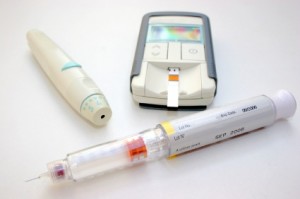April 17, 2014
 In a 1,100-word story on its front page, the New York Times (4/17, A1, Tavernise, Grady, Subscription Publication) reports that research published in The New England Journal of Medicine shows “the first broad national picture of progress against some of the most devastating complications of diabetes, which affects millions of Americans, finding that rates of heart attacks, strokes, kidney failure and amputations fell sharply over the past two decades.” Researchers found that the largest “declines were in the rates of heart attacks and deaths from high blood sugar, which dropped by more than 60 percent from 1990 to 2010, the period studied.” The study’s lead author, Edward W. Gregg, a senior epidemiologist at the CDC, “said researchers used four federal data sets – the National Health Interview Survey, the National Hospital Discharge Survey, the United States Renal Data System, and Vital Statistics – over a 20-year period to give a comprehensive picture of diabetes outcomes.”
In a 1,100-word story on its front page, the New York Times (4/17, A1, Tavernise, Grady, Subscription Publication) reports that research published in The New England Journal of Medicine shows “the first broad national picture of progress against some of the most devastating complications of diabetes, which affects millions of Americans, finding that rates of heart attacks, strokes, kidney failure and amputations fell sharply over the past two decades.” Researchers found that the largest “declines were in the rates of heart attacks and deaths from high blood sugar, which dropped by more than 60 percent from 1990 to 2010, the period studied.” The study’s lead author, Edward W. Gregg, a senior epidemiologist at the CDC, “said researchers used four federal data sets – the National Health Interview Survey, the National Hospital Discharge Survey, the United States Renal Data System, and Vital Statistics – over a 20-year period to give a comprehensive picture of diabetes outcomes.”
The AP (4/17, Stobbe) reports that decline is largely “attributed to better screening, medicines and care.” These “improvements came even as the number of U.S. adults with diabetes more than tripled in those 20 years.”
Reuters (4/17, Emery) reports that Gregg said, however, “If we don’t do something to reduce the incidence of diabetes, we’re going to have a lot more diabetes complications down the road.”
Bloomberg News (4/17, Ostrow) reports that similarly, study author Linda Geiss, head of diabetes surveillance at the CDC, said in an interview over the phone, “Although we’ve seen a decline in the rates and we’ve come a long way in preventing the complications and improving the quality of life for people with diabetes, most of the numbers are still increasing.” Geiss added, “We need to make some progress in preventing Type 2 diabetes in order to help decrease these numbers.” Also covering the story are TIME (4/17, Sifferlin) and HealthDay (4/17, Gordon).
Article courtesy American Medical Association
Speak Your Mind